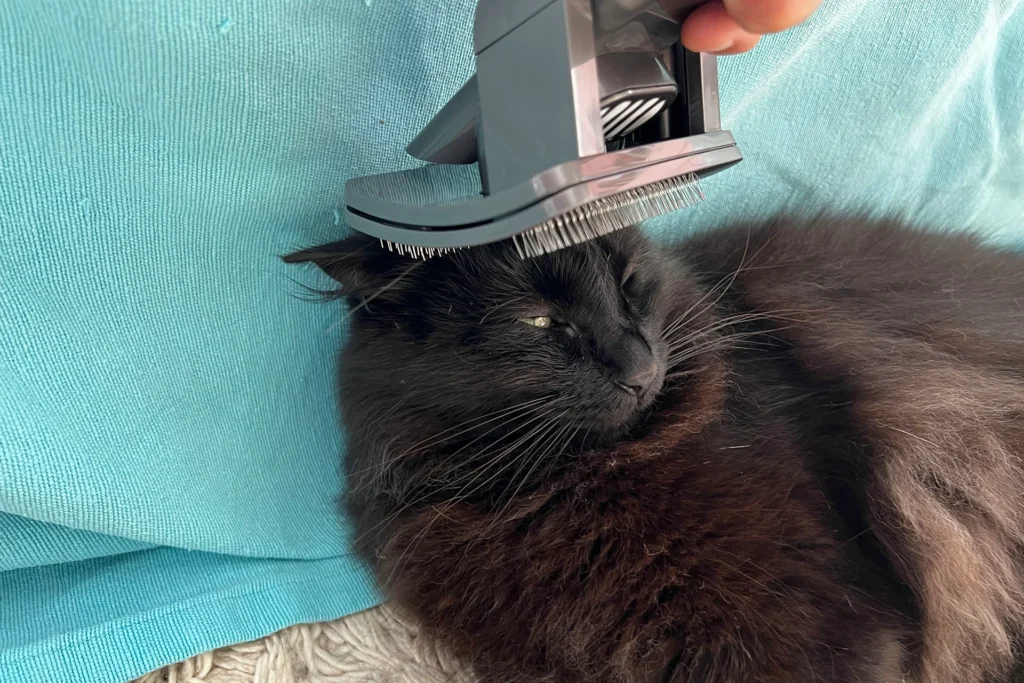What Can I Give My Cat For Pain ?

What Can I Give My Cat For Pain :- Addressing feline discomfort poses a unique set of challenges. Detecting signs of pain in cats proves challenging, given their adeptness at concealing it. Furthermore, conventional pain medications for other animals often fall short or pose risks for our feline companions.
Yet, the well-being of our cats is paramount. Fortunately, with heightened observational skills, it becomes feasible to alleviate your cat’s distress. Discover suitable pain relief options for cats, recognizing equally crucial what should be avoided in the process.
Your feline companion isn’t just a pet; they’re a cherished member of the family. Witnessing them in discomfort is distressing. If you observe changes like increased sleep, a limp, or reluctance to jump, the immediate instinct is to alleviate their suffering. However, reaching for your medicine cabinet may not be the solution – in fact, it could inadvertently worsen the situation.

What is pain?
Professionals in pain management characterize pain as “an unpleasant sensory and emotional experience linked with real or potential tissue damage.”
Quantifying pain proves highly subjective and intricate, with manifestations as diverse as injuries, conditions, and individual experiences. The exhibition of pain in pets varies widely, and in cats, it becomes even more elusive. Broadly speaking, if an experience would cause discomfort to a human, it’s likely to have a similar effect on a cat. Understanding this subjective nature is crucial for providing effective pain management in feline companions.
What Can I Give My Cat For Pain ? Are Human Pain Meds Safe for Cats?
Numerous human pain relievers pose severe threats to cats, even in minuscule amounts. Remarkably, a standard Tylenol tablet carries sufficient acetaminophen to be lethal for some feline companions. Acetaminophen inflicts extensive harm on a cat’s red blood cells and liver, making it an unsuitable remedy for cat pain.
Over-the-counter non-steroidal anti-inflammatories (NSAIDs) like Advil (ibuprofen), Aleve (naproxen), and aspirin also harbor risks for cats. Their usage can result in gastrointestinal ulcers, liver and kidney damage, and abnormal blood clotting.
While there may be instances where a veterinarian prescribes these medications (such as aspirin for cats prone to blood clots), such prescriptions occur only in highly specific circumstances and at exceedingly low dosages.

If, by any chance, you find yourself having administered a higher dosage of cat pain medication than prescribed, it’s imperative to promptly contact your veterinarian or reach out to Animal Poison Control at 1‐888‐426‐4435. Swift action in such situations is crucial to ensuring the well-being of your feline companion.
Signs Your Cat May Be in Pain
What Can I Give My Cat For Pain ? Identifying signs of discomfort in your cat may pose a challenge, but it’s certainly achievable. A keen observation of your cat’s day-to-day activities may unveil some distinctive cues. Watch out for potential indicators suggesting your cat might be experiencing pain:
1. Reduced appetite
2. Restlessness
3. Stiffness or limping
4. Diminished interest in play
5. Vocalizations like meowing or hissing when touched
6. Aggressive behavior, such as hissing or biting when approached or held
7. Difficulty using the litter box
8. Lack of interest in grooming or focusing on specific body areas
9. Excessive licking or biting of a particular body region
10. Struggles in jumping on or off furniture
11. Coordination difficulties
12. Hiding or avoiding social interaction with people or other pets

If any of these behaviors manifest, it’s advisable to promptly consult your veterinarian for a thorough diagnosis and to explore potential pain treatment options.
What Can I Give My Cat For Pain ? How is pain treated in cats?
What Can I Give My Cat For Pain ? When your cat is slated for a surgical or dental procedure, it’s essential to inquire about the pain management plan. Such procedures typically necessitate postoperative pain control, with the duration varying based on the specific intervention. Typically, your cat will be administered pain-relief medications before, during, and after the surgery or dental work. Your veterinarian will tailor the choice of drugs to your pet’s individual requirements.
Several commonly used veterinary pain-relief medications include:
1.Nonsteroidal Anti-Inflammatory Drugs (NSAIDs): These medications impede the body’s production of inflammatory molecules responsible for pain and swelling. While effective for mild to moderate pain, NSAIDs require cautious use due to potential complications involving the liver, kidneys, stomach, or intestines. It’s crucial never to administer over-the-counter NSAIDs to your cat, as some can be hazardous.
2. Opioids: Reserved for more intense pain, opioids such as morphine, codeine, fentanyl, buprenorphine, and hydromorphone are employed. Opioids are crucial for managing severe surgical pain and may also be applicable in advanced cancer cases or for controlling severe arthritis pain, contributing to an improved quality of life for cats with severe chronic pain.

3. Other Options: Innovative applications of existing medications, including gabapentin, tramadol, and maropitant citrate, provide additional pain-relief possibilities for cats.
Recognizing that pain is a substantial unmet medical need for both humans and cats, vigilance towards behavioral changes indicative of pain, coupled with collaboration with your veterinarian, can contribute to ensuring your cat enjoys a life free from discomfort.




